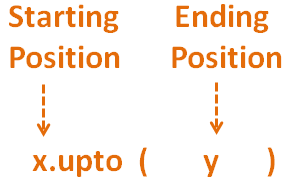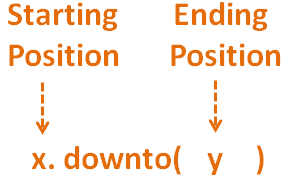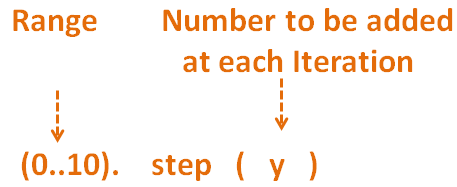

So far we have seen, how to Iterate through an Array or Hash using a for loop.
the_array = [1, 3, 5, 8] for i in the_array puts i end
Now, there is another way by which we can Iterate an Array or Hash. And that is an Iterator.
An Iterator is a Ruby object that is used to Iterate an Array or Hash.
To understand Iterator, let us rewrite the above example with each Iterator.
the_array = [1, 3, 5, 8] the_array.each do |i| puts i end
So, in the above code, what we have done is, created a list named, the_list.
the_array = [1, 3, 5, 8]
And used the each statement to iterate the Array.
the_array.each do |i| puts i end

The first task would be, to get the values of the array, the_array.
So, in the first iteration, the first value of the Array (i.e. 1) is taken to the variable i. And the print statement,
puts i
Prints the first element of the Array the_array.
1
And in the same way the other elements of the Array are printed.
Say, we want to Iterate a loop and print the numbers from 0 to 9. A simplest solution could be the times Iterator.
x = 10 x.times do |i| puts i end
So, in the above code, what we have done is, printed the values from 0 to 9.
And we have achieved using times Iterator.
x.times do |i| puts i end
The initial value of i is automatically set to 0 at the beginning of the loop. And at each Iteration, the value of i gets incremented by 1.
And prints the value of i at each Iteration.
Say, we want to Iterate a loop and print the numbers from 5 to 9. Again that can be achieved using the upto Iterator.
x = 5 y = 9 x.upto(y) do |i| puts i end
So, in the above code, what we have done is, printed the values from 5 to 9.
And we have achieved using upto Iterator.
x.upto(y) do |i| puts i end

The initial value of i is automatically set to the value of x(i.e. 5). And the ending position is set to y(i.e. 9).
And at each Iteration the value of i gets incremented by 1, printing the value of i at each Iteration.
The Downto Iterator is just the opposite of Upto Iterator.
Say, we want to Iterate a loop and print the numbers from 9 to 5. Again that can be achieved using the downto Iterator.
x = 9 y = 5 x.downto(y) do |i| puts i end
So, in the above code, what we have done is, printed the values from 9 to 5.
And we have achieved using downto Iterator.
x.downto(y) do |i| puts i end

The initial value of i is automatically set to the value of x(i.e. 9). And the ending position is set to y(i.e. 5).
And at each Iteration the value of i gets decremented by 1, printing the value of i at each Iteration.
Say, we want to Iterate a loop and print the even numbers between 0 to 10. So, exactly 2 has to added to each number at each number.
0, 2, 4, 6, 8, 10
This can be achieved using the step Iterator.
x = 2 (0..10).step(y) do |i| puts i end
So, in the above code, what we have done is, printed the numbers,
0, 2, 4, 6, 8, 10
And we have achieved using step Iterator.
(0..10).step(y) do |i| puts i end

The initial value of i is automatically set to the value of the range i.e. (0..10)
And at each Iteration the value of i gets incremented by x(i.e. 2), printing the value of i at each Iteration.
Say, we have the below paragraph,
And we want each line to be printed at each Iteration.
This can be achieved using the each_line Iterator.
x = "In a huge pond, there lived many fish. They were arrogant and never listened to anyone." x.each_line do |i| puts i end
Say, we have an Array.
a = [1,2,3,4,5]
And we want to multiply each element with 5 and display the result.
i.e.
1 * 5 2 * 5 3 * 5 4 * 5 5 * 5
This can be done in a single line using collect Iterator.
a = [1,2,3,4,5]
b = a.collect{|i| i*5}
puts b
